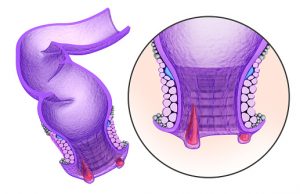 If you’re over the age of 50, you are at much greater risk for developing hemorrhoids. Although hemorrhoids aren’t dangerous, they are a pain in the you-know-what. If you’ve ever had hemorrhoids, you can attest to the fact that they are painful and can negatively impact your daily life. If you haven’t experienced them yet, then consider yourself lucky, but you will want to take the necessary steps to prevent them and save yourself from any suffering.
If you’re over the age of 50, you are at much greater risk for developing hemorrhoids. Although hemorrhoids aren’t dangerous, they are a pain in the you-know-what. If you’ve ever had hemorrhoids, you can attest to the fact that they are painful and can negatively impact your daily life. If you haven’t experienced them yet, then consider yourself lucky, but you will want to take the necessary steps to prevent them and save yourself from any suffering.
How are hemorrhoids caused?
The most common cause of hemorrhoids is constipation, which is known to increase with age. When you are pushing while sitting on the toilet, this puts pressure on the veins in the rectal area, which causes the veins to become enlarged.
Advertisement
Hemorrhoids may also be hereditary and triggered by obesity or liver disease.
Symptoms of hemorrhoids
Hemorrhoids can be external or internal. Internal hemorrhoids often tend to be painless, but once they protrude outside of the anus, that is when a person may begin to experience pain. Internal hemorrhoids that protrude out may lead to blood clots, but these are not dangerous.
Other symptoms you may experience include:
- Anal pain
- Anal itching
- Purplish lump around the anus
- Reddish mass of tissue around the anus
- Bright red blood on toilet paper after wiping or even in the toilet bowl or on your underwear
- Mucus on underwear
- Feces on underwear
Because the signs and symptoms are similar to that of other conditions, including anal fissures, it’s important that you see your doctor so they can rule out any serious problems.
During a hemorrhoid examination, your doctor will inspect your anus. They may insert a lubricated finger into your anus to feel around for a hemorrhoid or to rule out an abscess. It can be more challenging to diagnose internal hemorrhoids, so you doctor may use an anoscope, a proctoscope, or a sigmoidoscope, which are flexible tubes that allow your doctor to see inside the anus and rectum.
Treatment and prevention of hemorrhoids
Your doctor may advise you to try a combination of treatments to treat hemorrhoids, which include soaking in a warm bath, applying ice packs, applying hemorrhoid creams, and ensuring that you are properly cleaning the area.
In the case of more persistent hemorrhoids, your doctor may have to perform a procedure known as rubber band ligation. This procedure uses a rubber band to cut off circulation to the hemorrhoid until it falls off. Other treatments include a chemical injection to shrink the hemorrhoid or a laser or heat therapy to harden and shrink the hemorrhoid.
In severe cases, you may be required to undergo surgery. The swollen veins will be removed by stapling, which blocks blood flow to the area.
If none of these options sounds ideal to you, then you will most likely want to prevent hemorrhoids in the first place. Hemorrhoid prevention involves eating a healthy diet rich in fiber, which staves off constipation that puts strain on the anal veins.
Advertisement
Constipation can also be caused by certain medications, so you will want to speak to your doctor about other drug options. Constipation may also be a result of lack of exercise, so it’s important that you exercise regularly.
If you develop hemorrhoids, it could be a wake-up call that something in your life needs to change, whether it be your diet or your exercise regime. Living as healthy as possible can help you lower your risk of painful hemorrhoids.
Related: Hemorrhoids (piles) triggered by pregnancy, constipation, relieved by home remedies and exercise
